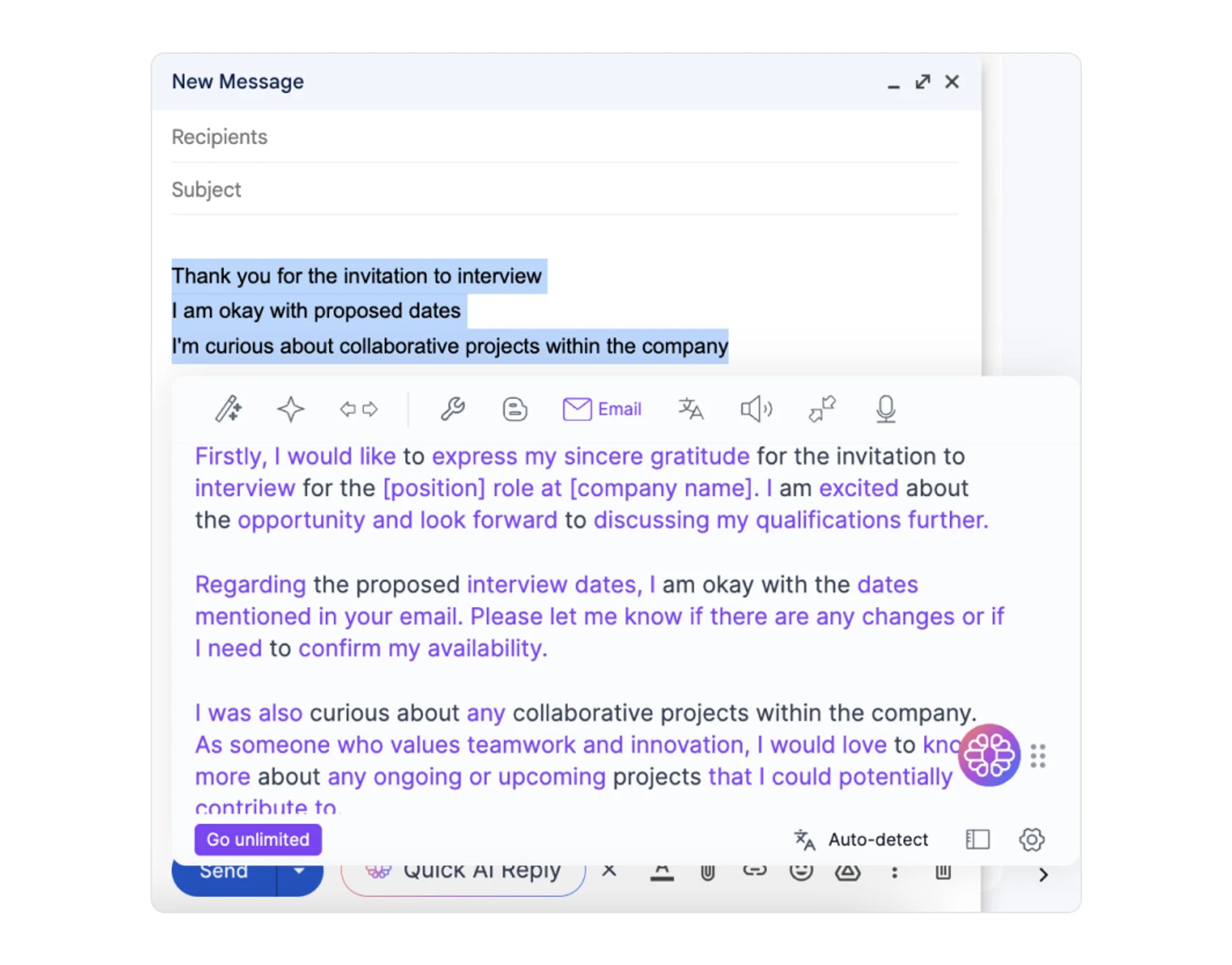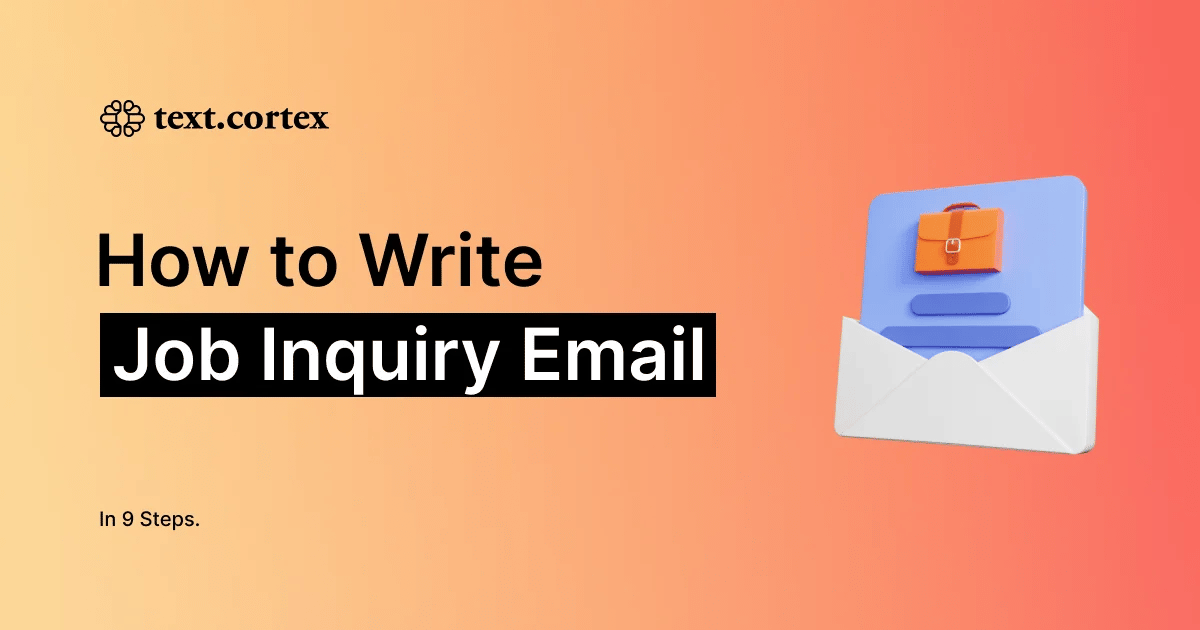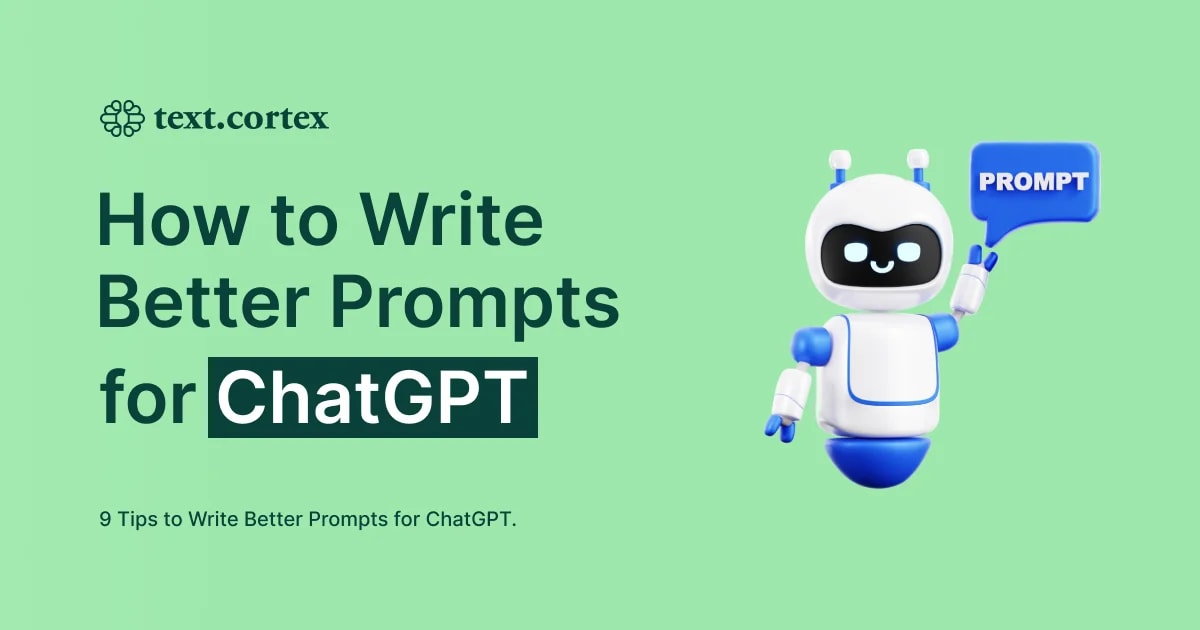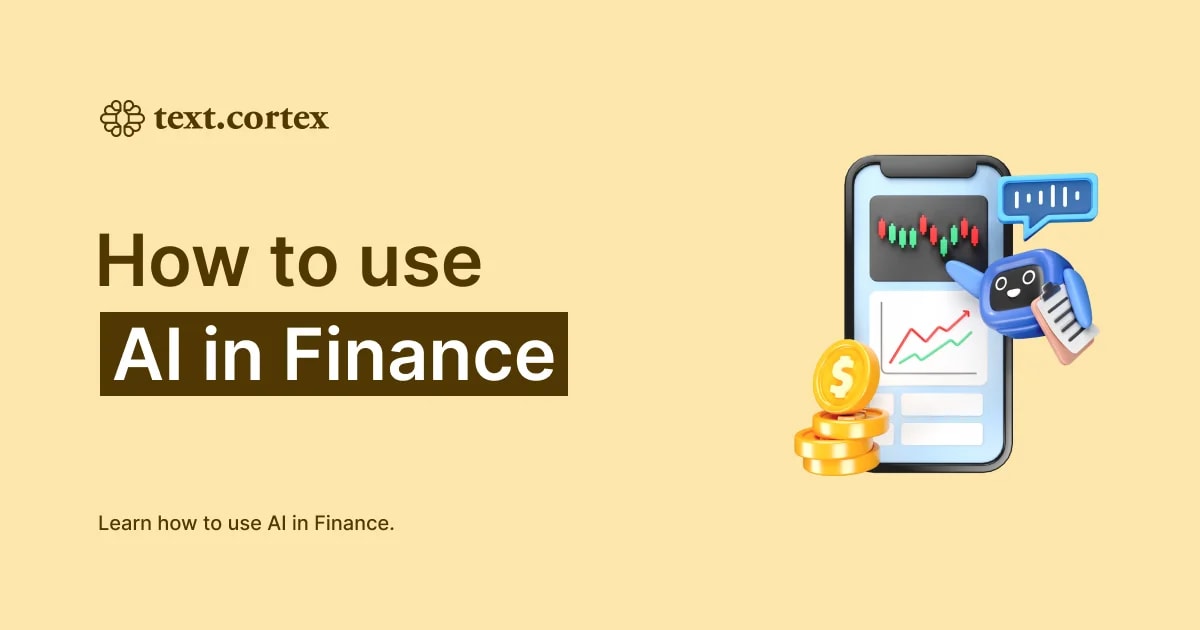Are you curious about how to reply to interview invitation emails without appearing overly excited?
If so, you are in the right place!
In this article, we'll cover 6 tips on crafting the perfect reply, as well as plenty of examples for you to choose from.
Let’s start!
Why Should You Reply to an Interview Invitation Email?
You should always reply to an interview invitation email because it represents your professionalism and interest in the position.
By replying to an interview invitation you have the opportunity to:
➡️ Confirm important details such as the date, time, and location of the interview
➡️ Gather any further instructions or requirements that may be necessary
➡️ Set the tone for your entire interaction with the employer
Even if your situation has changed, and you no longer want the job you applied for, it is important to answer and explain your reasons.
How to Reply to an Interview Invitation Email?
1. Show Appreciation
Begin by sincerely thanking the sender for contacting you and considering your application.
This is not just about showing respect and politeness, but about showing appreciation for the opportunity you get.
It also helps you to start emailing on a positive note with that person from the very beginning.
1. Example for showing appreciation #1:
“I wanted to take a moment to express my sincere appreciation for reaching out to me regarding the [Position Title] role at [Company Name]. ”
2. Example for showing appreciation #2:
"Thank you for considering me for the [Position] role at [Company].”
2. Show Your Passion for the Position
Expressing enthusiasm in your interview invitation email demonstrates your genuine interest and commitment to the position.
An enthusiastic candidate is frequently viewed as someone who is prepared to go above and beyond in their role and is eager to learn, grow, and improve.
1. Example of how to show your passion #1:
“I'm genuinely excited about the opportunity to interview for the [Position Title] role at [Company Name]. It seems like a great fit for my skills and interests, and I'm eager to learn more about the team and the work you do.”
2. Example of how to show your passion #2:
“Just wanted to say how excited I am about the opportunity to interview for the [Position Title] role at [Company Name]. It seems like a great opportunity to learn and grow, and I'm grateful for the chance to be considered.”
💡 ProTip
If you're worried about your email sounding too dull, use TextCortex's Tone Changer feature!
You can rewrite the original text in one of the following tones of voice:
Simply provide your text and choose the one that suits your needs 👇
3. Confirm Your Availability
Before agreeing to an interview date and time, ensure you have no prior commitments that could cause a conflict.
It's acceptable to request an alternative date if necessary, but avoid canceling or rescheduling at the last minute.
Punctuality and commitment are crucial in this scenario.
And, in case you need help with accepting or moving the interview, follow these examples:
1. Example to Postpone the Interview #1:
"I am reviewing the proposed interview date and time. To avoid any conflicts, could we possibly adjust the schedule, or should I arrange to accommodate it? I aim to be punctual and fully committed to the interview."
2. Example to Postpone the Interview #2:
"I'd like to confirm the interview but would like to propose an alternative date and time of [alternative date or time]. Is this possible?"
3. Example to Accept the Interview Invitation #3:
"I confirm my availability for the interview on [Date] at [Time], as you suggested. This timing suits me well, and I have reserved it in my calendar."
4. Keep a Professional Tone
Maintaining professionalism in your interview invitation email is essential for making a good impression on the hiring manager.
It shows respect, maturity, and your commitment to the opportunity at hand.
Avoid using informal language or slang.
Instead, use a courteous writing style, including:
- proper grammar,
- spelling, and
- punctuation.
Address the hiring manager with respect, using suitable titles like "Mr." or "Ms.," and beginning with a professional greeting like "Dear [First Name] [Last Name],".
1. Example for using title and name:
"Dear Ms. [Last Name],
I appreciate the consideration of my application. I am writing to confirm my availability for the interview regarding the [Position Title] position at [Company Name]."
2. Example for using first and last name:
"Dear [First Name] [Last Name],
I want to convey my appreciation for the invitation to interview for the [Position Title] role at [Company Name]. It's truly an honor to be considered for this opportunity."
💡 ProTip
With TextCortex, you can always rewrite the text if you are afraid that it sounds too casual. Write the text, click the magic wand icon and the results will appear in a matter of seconds 👇
5. Ask Question
Asking questions can give your hiring manager the impression that you are well-prepared and detailed.
It allows you to demonstrate your knowledge about the company and the role, as well as obtain a deeper understanding of what the employer is looking for in a candidate.
1. Example for asking about the role:
“Thank you for the invitation to interview for the [Position] role at [Company]. I'm very excited about the opportunity. I have a few preliminary questions about the position that I would love to discuss at the interview, if possible. Specifically, I'm curious about [specific topic or question]."
2. Example for asking about the company:
“Thank you for the invitation to interview for the [Position] role. I'm excited about the possibility of joining your team. As I prepare for the interview, I have a few questions regarding [specific aspects of the company]. Could we take some time during the interview to explore [topic or question] together?"
💡 ProTip
With TextCortex, writing an email is as easy as providing 3 bullet points.
For example, write a thank you note, availability confirmation, and a question.
Our tool will take care of expanding those points into a full email 👇

6. Offer To Provide Additional Information
Include a brief statement that you are available to provide additional documentation or materials that may be beneficial to the interview process.
This way, you can show that you are dedicated and that you want to prepare for that day.
1. Example for offering additional information:
“If there is any additional information or documentation that would be beneficial for the interview, please do not hesitate to let me know. I am more than happy to provide any information that would help you make a decision."
How to Reply to Interview Invitation Email — Do’s and Don'ts
Do’s
✅ Reply Quickly
When you receive an interview invitation, it is best to respond within 24 hours.
You may want to enable email notifications on your phone or computer so that you can respond to emails as they arrive, even if you're on the road.
💡 ProTip
When you're on the go and don't have much time to focus on writing an answer, use TextCortex's Quick AI Reply feature!
Provide just 1 sentence with the main message and TextCortex will expand it into a whole email 👇
✅ Meticulously Proofread Your Email
Before sending your email, take the time to thoroughly check for any errors.
Typos, grammatical mistakes, and other inaccuracies can make you appear unprofessional and may negatively influence a hiring manager’s impression of you.
So, how to by-pass such mistakes?
- Read your email aloud to catch errors.
- Double-check spelling, grammar, and punctuation.
- Ensure all details like the date, time, and address are correct.
This careful review helps prevent misunderstandings and ensures you present yourself in the best possible light.
💡 ProTip
TextCortex allows you to fix mistakes in just one click! Highlight the part of the text where you made a mistake and click the wrench - that’s all you have to do 👇
✅ Keep It Short
Keep your message concise and to the point.
The interview exists so that you can present yourself better with all the details, so there is no point in doing it in an email.
It is much better if you focus on agreeing on the details of the interview and asking relevant questions.
Don’ts
❌Don’t Use Emojis
Using emojis in a reply to an interview invitation email is unprofessional and inappropriate.
They can make the impression that you don't take the opportunity or the employer seriously.
So, keep them when you are chatting with friends and family, but not in professional writing!
❌Don’t Be Overly Excited
It's important to show enthusiasm in your answer, but it's not good to overdo it either.
You can very easily cross the line and sound rude and desperate.
Avoid using exclamation marks, repeating how grateful you are, or thanking too much.
Top 2 Interview Invitation Email Templates
Template 1 - Reply to an Interview Invitation
“Dear [Interviewer's Name],
Thank you for considering me for the [position name] role at [company name]. I'm glad for the opportunity to interview with you and learn more about the position and company culture.
I am available for the interview at the proposed time and date and am ready to discuss my qualifications and experience further. Should you need any specific materials or documents for the interview, please let me know.
Thanks again for this opportunity. I look forward to meeting with you soon.
Best regards, [Your Name]”
Template 2 - Rescheduling Interview Invitation
“Dear [Interviewer's Name],
Thank you for considering me for the [position name] role at [company name]. I appreciate the opportunity to interview with you.
Unfortunately, I won’t be able to attend the interview at the suggested time. Would it be possible to discuss some alternative dates and times that work for you?
Again, thank you for your kind consideration, and I hope we can find a new date and time that works well for both of us.
Best regards, [Your Name]”
How to Reply to an Interview Invitation Email Using TextCortex?
TextCortex is an AI tool designed to help you effortlessly create text for various purposes, including responding to interview invitations emails.
Whether you need to craft short or long-form content, this comprehensive platform streamlines the writing process with a host of powerful features:
🤖Zeno Chat - You can give it prompts and thus get content or answers to your questions.
🌐Web Search - Gather data from the Internet, news, Reddit, Twitter, YouTube, or Wikipedia. A new feature is that it allows you to search for patents.
🧑💻Digital Persona - Personalize Zeno and create a digital persona that mimics your writing style.
🖊️Editing features - Summarize, paraphrase, or rewrite any text you want.
🔧Fix grammar - Easily fix any grammar or spelling mistakes.
▶️Expand - Write a sentence and expand it into a whole paragraph.
🌎Translate - Translate existing text or write a new one in 25+ languages.
📄Templates - Use 60+ templates that cover numerous occupations.
⏳Snippets - With TextCortex’s new feature, Snippets, you can reduce the amount of time you spend on repeating phrases that you frequently use in email communication.
TextCortex provides a 14-day free trial for you to test all features.
Keep in mind that signing up for the free plan grants access to all assets. 😏
Sign up right away to enhance your email writing experience with ease!

.webp)


